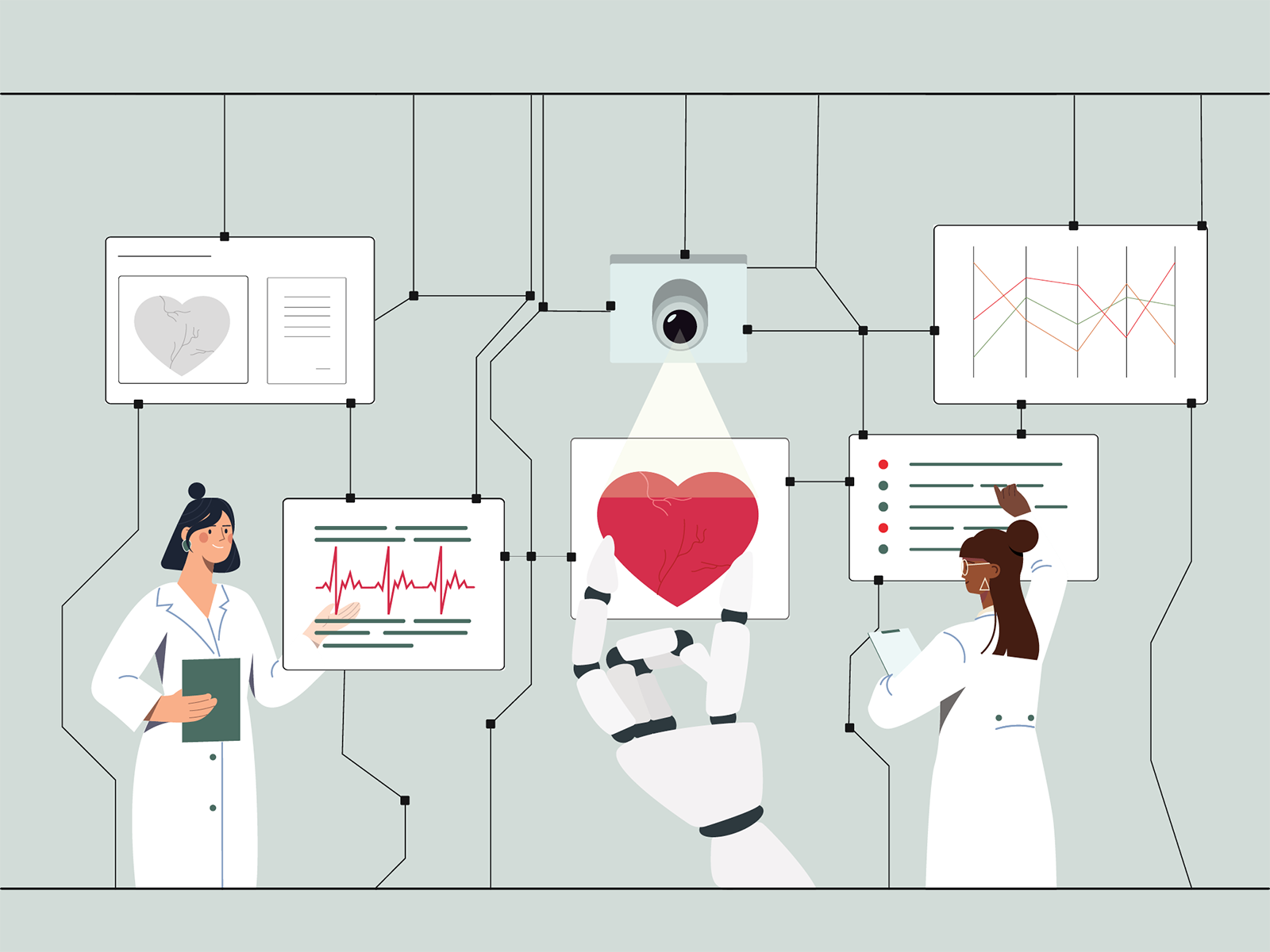
Issue 50
May 2024
AFFAIRS OF THE HEART
By Zhou Xinyan, second year student, NUS Yong Loo Lin School of Medicine, and Dr Wesley Yeung, Senior Resident, National University Heart Centre, Singapore

Cardiovascular disease (CVD) remains a leading cause of mortality worldwide, underscoring the critical need for innovative approaches to predict and prevent its onset. In recent years, the convergence of healthcare and technology has birthed promising advancements, particularly in the realm of artificial intelligence (AI). Leveraging the power of AI algorithms to analyse electrocardiogram (ECG) signals, researchers are embarking on a transformative journey towards early detection and intervention in major cardiovascular diseases.
The conventional paradigm of cardiovascular risk assessment often relies on established risk factors such as hypertension, hyperlipidemia, and smoking history. However, these measures may fall short in capturing subtle physiological changes that precede clinical manifestations of CVD. Herein lies the potential of AI: to unveil hidden patterns within ECG data that serve as harbingers of impending cardiovascular events.
Imagine a scenario where a routine ECG recording—a ubiquitous diagnostic tool in clinical practice—can serve as a gateway to personalised cardiovascular risk assessment. This vision is rapidly becoming a reality, thanks to groundbreaking research endeavours worldwide. By applying machine learning algorithms to vast repositories of ECG data, scientists are unravelling novel biomarkers and predictive signatures indicative of cardiovascular pathology.
The ECG is a widely available and non-invasive test that gathers physiological signals from the heart. Augmenting ECG analysis with AI can expand the use of this cardinal diagnostic test and reap the benefits of scalability and cost-effectiveness. The democratisation of cardiovascular risk assessment holds profound implications for population-wide health surveillance and early intervention strategies.
Recent studies have demonstrated the remarkable efficacy of AI-powered ECG analysis in detecting subtle abnormalities associated with various cardiovascular conditions. From arrhythmias to myocardial infarction, AI algorithms exhibit unparalleled accuracy in identifying patterns that elude human interpretation. By continuously updating our algorithms with new data and better performing architectures, we can enhance their predictive capabilities and enhance their diagnostic prowess over time. AI-driven ECG analysis represents a paradigm shift towards proactive disease management. By detecting subtle deviations from normal cardiac function long before symptomatic presentation, clinicians can intervene preemptively, potentially averting catastrophic cardiovascular events.
By harnessing the computational prowess of AI algorithms, clinicians can decipher complex patterns hidden within ECG data, enabling early identification of individuals at risk of major cardiovascular events. As we stride towards a future of precision medicine, let us embrace the transformative potential of AI to safeguard cardiovascular health for generations to come.”

Central to the success of AI in cardiovascular disease prediction is the collaborative synergy between clinicians, data scientists, and technologists. Interdisciplinary partnerships foster a holistic approach to data analysis, integrating clinical expertise with computational methodologies. Moreover, initiatives such as data sharing consortia and open-access repositories accelerate the development and validation of AI algorithms, ensuring their robustness across diverse patient cohorts.
Looking ahead, the integration of AI into routine clinical practice holds immense promise for transforming cardiovascular care delivery. Imagine a future where AI algorithms embedded within ECG machines provide real-time risk stratification during routine check-ups. Patients at heightened risk of cardiovascular events could receive tailored interventions, ranging from lifestyle modifications to pharmacotherapy, thereby mitigating the burden of disease on both individuals and healthcare systems.
At the National University Heart Centre Singapore, we are harnessing the wealth of cardiovascular data generated every day from caring for the cardiovascular health of Singaporeans in the region to create homegrown algorithms best suited to our local needs while discovering insights that can be shared with other centres through research and collaborations.
In conclusion, the marriage of AI and ECG signals heralds a new era in cardiovascular disease prediction and prevention. By harnessing the computational prowess of AI algorithms, clinicians can decipher complex patterns hidden within ECG data, enabling early identification of individuals at risk of major cardiovascular events. As we stride towards a future of precision medicine, let us embrace the transformative potential of AI to safeguard cardiovascular health for generations to come.
More from this issue

ALL IN THE FAMILY
Combating Antimicrobial Resistance in Primary Care
WATERING THE SEED
The Mr & Mrs Lim Weng Sam Scholarship

PEOPLE OF NUS MEDICINE
The French Connection

